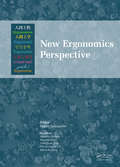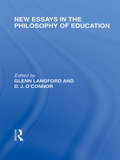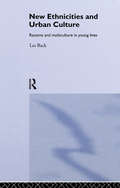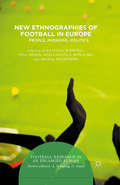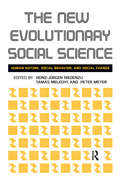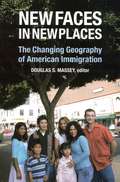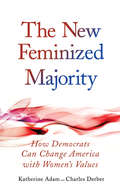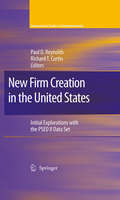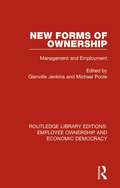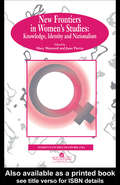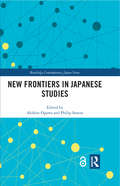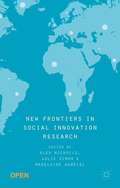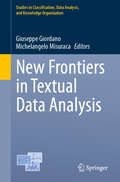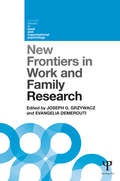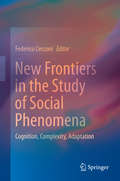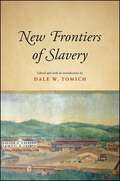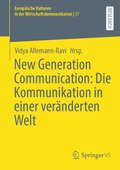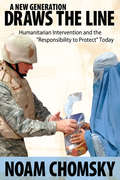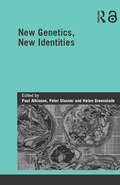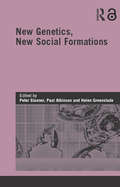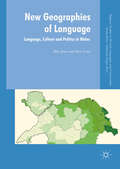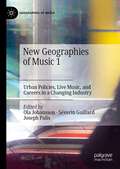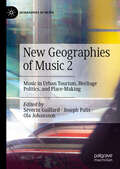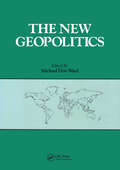- Table View
- List View
New Ergonomics Perspective: Selected papers of the 10th Pan-Pacific Conference on Ergonomics, Tokyo, Japan, 25-28 August 2014
by Sakae YamamotoNew Ergonomics Perspective represents a selection of the papers presented at the 10th Pan-Pacifi c Conference on Ergonomics (PPCOE), held in Tokyo, Japan, August 25-28, 2014.The first Pan-Pacific Conference on Occupational Ergonomics was held in 1990 at the University of Occupational and Environmental Health, Japan. The main theme of the PPCOE 1990
New Essays in the Philosophy of Education (International Library of the Philosophy of Education Volume 13)
by Glenn LangfordThe contributors to this collection of essays offer a stimulating and varied range of approaches to this developing area. The volume includes discussions on the concept of education and such related topics as indoctrination and the nature and scope of the theory of education. Aspects of education including the field of moral education, and issues which are reflected prominently in the curricula of such subjects as Mathematics and Science in schools and colleges are considered.
New Ethnicities And Urban Culture: Social Identity And Racism In The Lives Of Young People
by Les BackEngaging exploration of race and youth culture which examines the development of new identities, ethnicities and forms of racism. This text analyzes the relationship between racism, community and adolescent social identities in the African and South Asian diasporas.; This book is intended for undergraduate and postgraduate students on courses in race and ethnicity, urban sociology, cultural studies and social anthropology. It will also have some appeal within social policy and social work.
New Ethnographies of Football in Europe: People, Passions, Politics (Football Research in an Enlarged Europe)
by Nina Szogs Alexandra Schwell Malgorzata Z. Kowalska Michal BuchowskiFootball has emerged as an important symbolic field through which various social, cultural, political, economic, and historical dimensions and antagonisms are negotiated. This volume covers a variety of themes illuminating the multiple ways that football impacts on people's everyday lives. Using anthropological research methods and data collected from ethnographic fieldwork, the contributors scrutinize not only the social fields of football fans and the specific socio-cultural contexts in which they are embedded, but also other actors beyond the pitch, and the possibilities for both agency and subversion. Taking into account processes of Europeanization, globalization, commercialization and migration, the collection offers fresh insights into fan identity formations and practices and highlights the importance of anthropology's self-reflexive and actor-centred perspective.
New Evolutionary Social Science: Human Nature, Social Behavior, and Social Change
by Tamas Meleghy Peter Meyer Heinz-Jurgen NiedenzuSocial scientists have long declared their autonomy from the natural sciences, and in doing so have tended to neglect important biological constraints on human nature. Many sociological theories have suggested a nearly complete malleability of patterns of social life. The New Evolutionary Social Science challenges this view by building on Stephen K. Sanderson's 'Darwinian conflict theory' which sets out to synthesise sociological theories with key findings from biology into an overarching scientific paradigm. Configuring and expanding this groundbreaking theory, the contributors to this volume are well-known European and American experts in evolutionary science. The New Evolutionary Social Science develops a new basis for understanding social change and the world's future through a better integration of the natural and social sciences.
New Faces in New Places: The Changing Geography of American Immigration
by Douglas S. MasseyBeginning in the 1990s, immigrants to the United States increasingly bypassed traditional gateway cites such as Los Angeles and New York to settle in smaller towns and cities throughout the nation. With immigrant communities popping up in so many new places, questions about ethnic diversity and immigrant assimilation confront more and more Americans. New Faces in New Places, edited by distinguished sociologist Douglas Massey, explores today’s geography of immigration and examines the ways in which native-born Americans are dealing with their new neighbors. Using the latest census data and other population surveys, New Faces in New Places examines the causes and consequences of the shift toward new immigrant destinations. Contributors Mark Leach and Frank Bean examine the growing demand for low-wage labor and lower housing costs that have attracted many immigrants to move beyond the larger cities. Katharine Donato, Charles Tolbert, Alfred Nucci, and Yukio Kawano report that the majority of Mexican immigrants are no longer single male workers but entire families, who are settling in small towns and creating a surge among some rural populations long in decline. Katherine Fennelly shows how opinions about the growing immigrant population in a small Minnesota town are divided along socioeconomic lines among the local inhabitants. The town’s leadership and professional elites focus on immigrant contributions to the economic development and the diversification of the community, while working class residents fear new immigrants will bring crime and an increased tax burden to their communities. Helen Marrow reports that many African Americans in the rural south object to Hispanic immigrants benefiting from affirmative action even though they have just arrived in the United States and never experienced historical discrimination. As Douglas Massey argues in his conclusion, many of the towns profiled in this volume are not equipped with the social and economic institutions to help assimilate new immigrants that are available in the traditional immigrant gateways of New York, Los Angeles, and Chicago. And the continual replenishment of the flow of immigrants may adversely affect the nation’s perception of how today’s newcomers are assimilating relative to previous waves of immigrants. New Faces in New Places illustrates the many ways that communities across the nation are reacting to the arrival of immigrant newcomers, and suggests that patterns and processes of assimilation in the twenty-first century may be quite different from those of the past. Enriched by perspectives from sociology, anthropology, and geography New Faces in New Places is essential reading for scholars of immigration and all those interested in learning the facts about new faces in new places in America.
New Feminized Majority: How Democrats Can Change America with Women's Values
by Charles Derber Katherine AdamBuilding beyond Lakoff's election-year best-seller, Don't Think of an Elephant, this new book shows how the values of American voters are dramatically shifting. With the arrival of the 2008 election year, a rising "feminized majority"-made up of both women and men-is emerging as the pivotal force in American politics. Emerging trends show these values are broadly progressive and address not just the needs of women but the general interests of society. They are held by women substantially more than by men but have become the values held by a majority of all voters, including millions of men. Like earlier eras in American history, such as the New Deal, the rise of the feminized majority today presents an opportunity for the Democrats to become the governing party for decades to come. Looking beyond the 2008 election, Adam and Derber describe a new political strategy that targets the feminized base and opens up a window for major social justice movements to make progressive change. Like Lakoff's, this striking new book-perfectly timed for election year 2008-offers a new vocabulary for every citizen who wants to understand (and reimagine) American politics. It will intrigue and provoke readers, stirring new conversation among progressives and new insights for every citizen interested in politics, morality, religion, values, and social justice.
New Firm Creation in the United States
by Richard T. Curtin Paul D. ReynoldsThis volume includes contributions from the organizers and advisory board members of the Panel Study of Entrepreneurial Dynamics (PSED) II project, designed to enhance the scientific understanding of how people start businesses. Covering such topics as entrepreneurial behavior, demographic and gender factors, financing the emerging business, ownership arrangements, and the roles of social capital and technology, the information obtained includes data on the nature of those active as nascent entrepreneurs, the activities undertaken during the start-up process, and the characteristics of start-up efforts that become new firms. Including an appendix explaining the data collection procedures, the result is an introduction to the theories, conceptualizations, approaches, and measurement of the business creation process, and a guide for those planning more detailed analysis.
New Forms of Ownership: Management and Employment (Routledge Library Editions: Employee Ownership and Economic Democracy #3)
by Michael Poole Glenville JenkinsOriginally published in 1990. Why has the pattern of ownership in British industry changed so dramatically in recent years? This high-level and wide-ranging discussion on the developments of the industrial scene in Britain investigates why such changes have occurred, and explores their impact on management and work relations. The contributors consider whether this trend will continue, arguing that these changes will have far-reaching consequences for both western and eastern political economies in the twenty-first century. This title will be of interest to students of business, economics and management.
New Frontiers In Women's Studies: Knowledge, Identity And Nationalism
by June Purvis Mary MaynardThis text reveals the diversities which continue to shape women's beliefs and experiences. It includes debates on women and nationalisms, women and social policy, sexuality, black studies and ethnic studies, women and education, women and cultural production and women's studies and gender studies.
New Frontiers in Japanese Studies (Routledge Contemporary Japan Series)
by Akihiro Ogawa Philip SeatonOver the last 70 years, Japanese Studies scholarship has gone through several dominant paradigms, from ‘demystifying the Japanese’, to analysis of Japanese economic strength, to discussion of global interest in Japanese popular culture. This book assesses this literature, considering future directions for research into the 2020s and beyond. Shifting the geographical emphasis of Japanese Studies away from the West to the Asia-Pacific region, this book identifies topic areas in which research focusing on Japan will play an important role in global debates in the coming years. This includes the evolution of area studies, coping with aging populations, the various patterns of migration and environmental breakdown. With chapters from an international team of contributors, including significant representation from the Asia-Pacific region, this book enacts Yoshio Sugimoto’s notion of ‘cosmopolitan methodology’ to discuss Japan in an interdisciplinary and transnational context and provides overviews of how Japanese Studies is evolving in other Asian countries such as China and Indonesia. New Frontiers in Japanese Studies is a thought-provoking volume and will be of great interest to students and scholars of Japanese and Asian Studies.
New Frontiers in Social Innovation Research
by Alex Nicholls Julie Simon Madeleine GabrielNew Frontiers in Social Innovation Research
New Frontiers in Textual Data Analysis (Studies in Classification, Data Analysis, and Knowledge Organization)
by Michelangelo Misuraca Giuseppe GiordanoThis volume presents a selection of articles which explore methodological and applicative aspects of textual data analysis. Divided into four parts, it begins by focusing on statistical methods, and then moves on to problems in quantitative language processing. After discussing the challenging task of text mining in relation to emotional and sentiment analyses, the book concludes with a collection of studies in the social sciences and public health which apply textual data analysis methods.The refereed contributions were originally presented at the 16th International Conference on Statistical Analysis of Textual Data (JADT 2022), which took place in Naples, Italy, on July 6-8, 2022. The biennial JADT meeting discusses theories, problems, and practical uses of textual data analysis in various fields, sharing a quantitative approach to the study of lexical, textual, pragmatic or discursive features of information expressed in natural language.
New Frontiers in Work and Family Research
by Joseph G. Grzywacz and Evangelia DemeroutiThe purpose of this volume is to showcase alternative theoretical and methodological approaches to work and family research, and present methodological alternatives to the widely known shortcomings of current research on work and the family. In the first part of the book contributors consider various theoretical perspectives including: Positive Organizational Psychology System Theory Multi-Level Theoretical Models Dyadic Study Designs The chapters in Part Two consider a number of methodological issues including: key issues pertaining to sampling, the role of diary studies, Case Cross-over designs, Biomarkers, and Cross-Domain and Within-Domain Relations. Contributors also elaborate the conceptual and logistical issues involved in incorporating novel measurement approaches. The book will be of essential reading for researchers and students in work and organizational psychology, and related disciplines.
New Frontiers in the Study of Social Phenomena: Cognition, Complexity, Adaptation
by Federico CecconiThis book studies social phenomena in a new way, by making judicious use of computer technology. The book addresses the entire spectrum of classic studies in social science, from experiments to the computational models, with a multidisciplinary approach. The book is suitable for those who want to get a picture of what it means to do social research today, and also to get an indication of the major open issues. The book is connected to a database of code for simulations, experimental data and allows to activate a subscription to a teaching tool using NetLogo, a programming language widely used in the social studies. The authors are researchers with first-hand experience research projects, both basic and applied. The work will be useful for those who want to understand more of the social, economic and political phenomena via computer applications.
New Frontiers of Slavery (SUNY Press Open Access)
by Dale W. TomichThe essays presented in New Frontiers of Slavery represent new analytical and interpretive approaches to the crisis of Atlantic slavery during the nineteenth century. By treating slavery within the framework of the modern world economy, they call attention to new zones of slave production that were formed as part of processes of global economic and political restructuring. Chapters by a group of international historians, economists, and sociologists examine both the global dynamics of the new slavery, and various aspects of economy-society and master-slave relations in the new zones. They emphasize the ways in which certain slave regimes, particularly in Cuba and Brazil, were formed as specific local responses to global processes, industrialization, urbanization, market integration, the formation of national states, and the emergence of liberal ideologies and institutions. These essays thus challenge conventional understandings of slavery, which often regard it as incompatible with modernity.This book is freely available in an open access edition thanks to Knowledge Unlatched – an initiative that provides libraries and institutions with a centralized platform to support OA collections and from leading publishing houses and OA initiatives. Learn more at the Knowledge Unlatched website at: https://www.knowledgeunlatched.org/, and access the book online at the SUNY Open Access Repository at http://hdl.handle.net/20.500.12648/1707.
New Generation Communication: Die Kommunikation in einer veränderten Welt (Europäische Kulturen in der Wirtschaftskommunikation #37)
by Vidya Allemann-RaviCommunication of the new generation is upon us. It was not long ago that the idea of remote working or of machine learning seemed like futuristic endeavors. Yet now, the prospect of using various communication technologies to work for us has never been more feasible. We are navigating connected ecosystems and using data technologies and algorithms to keep pace with an ever-shifting business world. This volume focuses on the impact of communication in a changing world on society and business cultures. The issues that are raised by the authors of this volume range from exploring how language and technology interact in the workplace environment to considering the use of generative technologies and artificial intelligence in marketing and advertising. While the authors showcase a diversity of disciplinary and methodological approaches, they are united in their underlying belief that communication in a changing world is, by and large, a facilitator of dialogue, and is powered by interactions and expansive, cross-disciplinary conversations.
New Generation Draws the Line: Kosovo, East Timor, and the "Responsibility to Protect" Today
by Noam ChomskyFirst Published in 2016. Routledge is an imprint of Taylor & Francis, an Informa company.
New Generation Political Activism in Ukraine: 2000–2014 (Routledge Advances in Sociology)
by Christine EmeranIndividuals in the post-Communist Ukraine dealt with a political climate of stalled reforms and corruption, leading to a mass distrust of many political institutions. This had a demobilizing effect on a citizen’s sense of capacity to effect social change. Therefore, the emergence of any individual to become an activist and involved in protest movements was a remarkable feat. So how does an individual become an activist in such a climate? This book explains how socio-cultural experiences shape an individual’s choices to become an activist in the authoritarian space of post-Soviet Ukraine by applying a cultural, actor-centred approach using qualitative methods of interviews and ethnography. The goal is to better understand the dynamics of individual decision-making between participants in collective protest actions under repressive conditions from the State using biographical narratives. The book covers multiple discussions with five young activists involved in the three largest protest events since Ukrainian independence in 1991: the Ukraine without Kuchma Movement of 2000–2001, the Orange Revolution of 2004, and the Euromaidan protests of 2014. This is valuable reading for students and researchers interested in political sociology, social movements and Ukrainian politics, and how these Ukrainian protests can be related to wider European political movements.
New Genetics, New Identities (Genetics and Society)
by Paul Atkinson Peter Glasner Helen GreensladeWhat implications are applications of new genetic technologies in biomedicine having on social identity in today’s society? New Genetics, New Identities, a wide-ranging multi-disciplinary volume in the CESAGen Genetics & Society Book series, presents not only theoretical reflection but also empirical case studies drawn from an international array of authors. Including the highly controversial areas of reproductive technologies and use of human embryos in biomedical research, other key features include: a fresh analysis of a wide-range of social and political concerns in the development of new social identities examinations of the social implications of identity formation as a result from advances in genetic technologies from a number of perspectives both locally and globally resources of a wide range of social science disciplines to discuss significant sociological, anthropological, political and ethical issues. This superb collection is an essential informative read for postgraduates and academics in the fields of sociology, anthropology and scientific technologies giving a comparative approach to complex issues surrounding the social implications of these advances in a period of rapid social change.
New Genetics, New Social Formations (Genetics and Society)
by Paul Atkinson Peter Glasner Helen GreensladeNew genetic technologies cut across a range of public regulatory domains and private lifeworlds, often appearing to generate an institutional void in response to the complex challenges they pose. As a result, a number of new social formations are being developed to legitimate public engagement and avoid the perceived democratic deficit that may result. Papers in this volume discuss a variety of these manifestations in a global context, including: genetic data banks committees of inquiry non-governmental organisations (NGOs) national research laboratories. These institutions, across both health and agriculture, are explored in such diverse locations as Amazonia, China, Finland, Israel, the UK and the USA. This volume exhibits a clear thematic coherence around the impact of the new genetics and their associated technologies on new social formations, and the case studies included have a significant international focus, showing a balance between theoretical and empirical approaches in this rapidly changing field. This innovative new volume will be of interest to postgraduates and professionals in the fields of sociology, social anthropology, science and technology studies, and environmental studies.
New Geographies of Language: Language, Culture and Politics in Wales (Palgrave Studies in Minority Languages and Communities)
by Rhys Jones Huw LewisThis book develops a novel approach to the study of language, bringing it into dialogue with the latest geographical concepts and concerns and provides a comprehensive account of the geography of Welsh language analysing policy development, language use, ability and shift. The authors examine in particular: the different ways in which languages can be mapped; how geographical insights can be used to develop understandings of language use; the value of assemblage theory as a way of interpreting the social, technical and spatial aspects of language policy development; and the geographies that characterise institutional engagements with languages. This book will set a research agenda for the geographical study of language, developing a conceptual framework that will offer fresh insights to researchers in the fields of Applied Linguistics, Sociolinguistics, Minority Languages, Geolinguistics, and Public Policy.
New Geographies of Music 1: Urban Policies, Live Music, and Careers in a Changing Industry (Geographies of Media)
by Ola Johansson Séverin Guillard Joseph PalisThis book is the first installment of a trilogy that explores the spatial dimensions of music. Music has generated substantial interest among geographers, but other academic disciplines have also developed related spatial perspectives on music. This trilogy brings together multiple approaches, each book investigating a bundle of interrelated themes. New Geographies of Music 1: Urban Policies, Live Music, and Careers in a Changing Industry starts with an introduction that explores contemporary approaches to the study of popular music. The following chapters address a range of issues, including the role of live music in urban development, how knowledge about local music ecosystems circulates among cities, urban networks of music production, how musical practices in local scenes are affected by core-periphery relations, and how musicians rely on touring in order to earn a living. This is a must-read for anyone interested in the relationship between space and music.
New Geographies of Music 2: Music in Urban Tourism, Heritage Politics, and Place-Making (Geographies of Media)
by Ola Johansson Séverin Guillard Joseph PalisThis book is the second installment of a trilogy that explores the spatial dimensions of music. Music has generated substantial interest among geographers, but other academic disciplines have also developed related spatial perspectives on music. This trilogy brings together multiple approaches, each book investigating a bundle of interrelated themes. New Geographies of Music 2: Music in Urban Tourism, Heritage Policies and Place-making starts by exploring contemporary approaches to the study of popular music, as well as the relations existing between music, tourism, heritage and urban geography. The chapters address a range of issues, including how music shapes the “feel” of touristic towns and urban public spaces, how music scenes have an increasing role in heritage and tourism policies, and how this recognition of music has consequences on artistic practices and urban imaginaries. This is a must-read for anyone interested in the relationship between space and music.
New Geopolitics
by Michael Don WardFirst Published in 1992. This volume focuses upon the synergy between geography and international politics. A new geopolitics is developed bringing together the insights of political geography and international relations. In each chapter, leading scholars focus on the spatial context through which contemporary world politics are conducted. War, conflict, cooperation, state building and power are examined in a geopolitical context.
